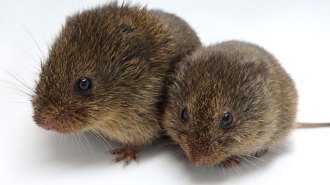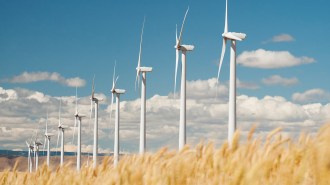Search Results
Curbing Climate Change
The emissions of greenhouse gases through human activities are changing the world and making it warmer. But there are technologies and strategies that can reduce these emissions and slow climate change. In this activity, students will research methods of reducing carbon dioxide production and removing carbon from the atmosphere and present on their findings.

Voles Don’t Need Oxytocin to Bond
Scientists thought the “love hormone” oxytocin was required to help animals form social bonds. In this Guide, students will learn how a study using a gene-editing tool called CRISPR is questioning that perspective — at least for prairie voles.
CRISPR Explained
Students will learn how CRISPR gene-editing technology works and discuss its applications and its importance to research.
Learning Outcomes: Learning about CRISPR and why it is an important technology
Prairie voles can couple up even without the ‘love hormone
Students will answer questions about the online Science News article “Prairie voles can find partners just fine without the ‘love hormone’ oxytocin,” which explores how scientists upended a common understanding of the hormone by using CRISPR technology. A version of the article “Voles don’t need oxytocin to bond” appears in the February 25, 2023 issue of Science News.
The Past, Present and Future of Spaceflight
Have you ever wondered how the people who get to fly in space are chosen? The path to becoming an astronaut has changed a lot over the years. In this activity, students will learn about the space travelers of the past and present — and consider a future where the diversity of astronauts better reflects the diversity of all of humankind. Students will use their creative writing skills to imagine this future.
Fermentation and Pasteurization in the classroom
The multitalented Louis Pasteur was a chemist, biologist, the father of microbiology and the inventor of pasteurization. In this hands-on lab, students will learn about Pasteur’s contributions by conducting an inquiry-based yeast fermentation experiment that explores the concept of pasteurization. In this experiment, students will observe, calculate and graph the volume of carbon dioxide produced by yeast during fermentation at different temperatures and identify the point where the yeast have been killed and pasteurization occurs.

Chemists Crack the Code to Ancient Roman Concrete
The ancient Romans built concrete structures that have stood for thousands of years. In this Guide, students will learn how scientists experimented to make Roman-style concrete — without causing explosions!
Concrete physical and chemical changes
Use a real-life example to give students a deeper understanding of physical and chemical changes and properties of substances.
Write a scientific question based in history
In this quick activity, students will write a scientific question to learn more about a historical artifact.
Learning Outcomes: Asking scientific questions
Mix concrete like a Roman
Students will answer questions about the online Science News article “These chemists cracked the code to long-lasting Roman concrete,” which explains the process scientists used to re-create the Romans’ superb building material. A version of the article, “Chemists Crack the Code to Ancient Roman Concrete,” appears in the February 11, 2023 issue of Science News.
Lake scavenger hunt
Lakes can vary in color based on levels of sediment, organic matter and algae. Sometimes though, a lake will stand out – not matching the other lakes in an area. Look for these anomalies by participating in a virtual lake scavenger hunt, and help figure out why these lakes don’t fit in! In this activity, students will learn how climate change influences lake color and will investigate lakes with irregular colors that have been impacted by natural or human-made forces.

The Road to Net-Zero
Human activities pump a lot of greenhouse gases into the atmosphere, and those emissions are driving climate change. In this guide, students will review greenhouse gases and their sources and learn about ways to reduce emissions.